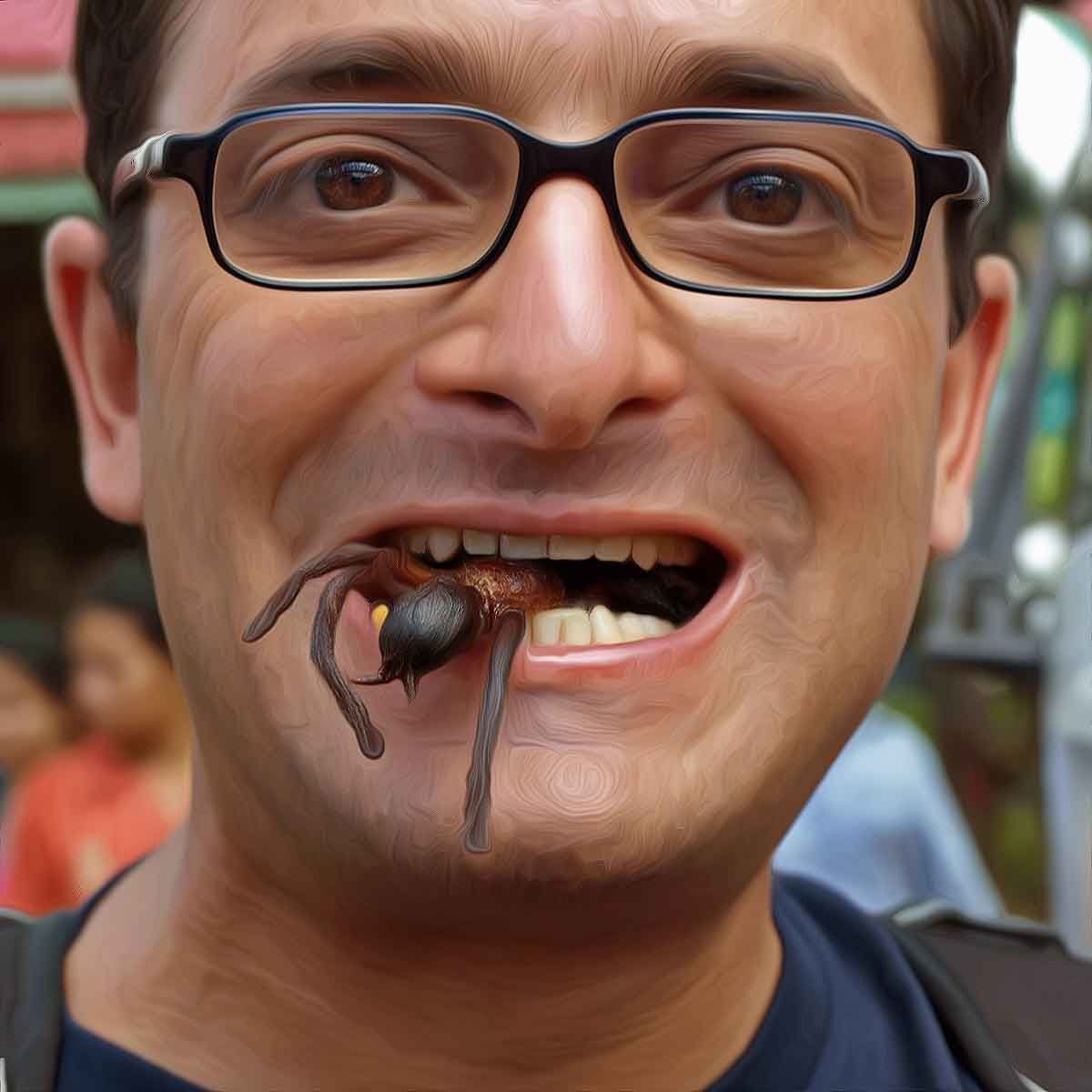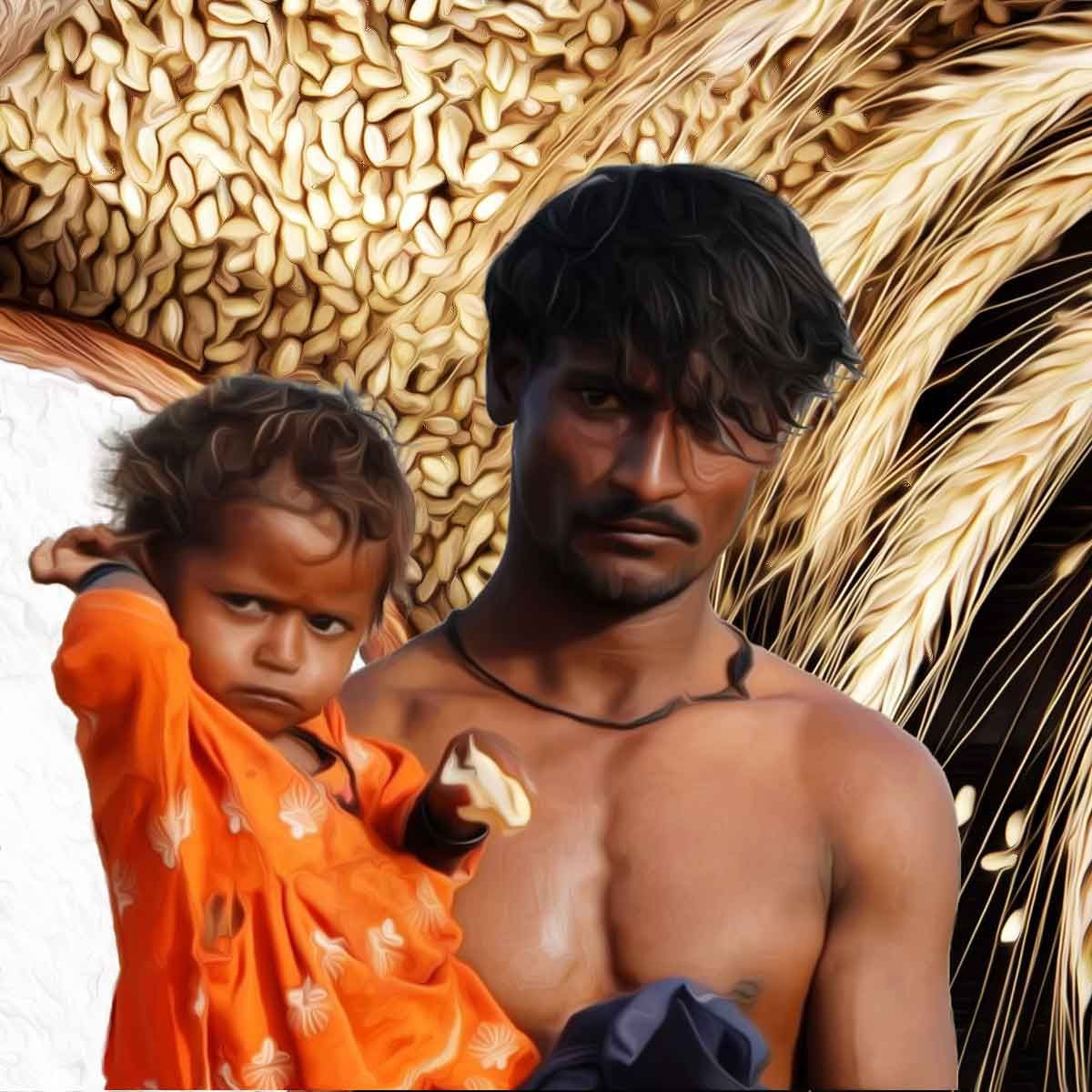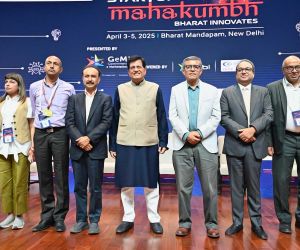MORE COVERAGE
Twitter Coverage
Satyaagrah
Written on
Satyaagrah
Written on
Satyaagrah
Written on
Satyaagrah
Written on
Satyaagrah
Written on
JOIN SATYAAGRAH SOCIAL MEDIA
"Only bugs can truly appreciate the beauty of flowers!!! Now, let's eat them": Soaring price rise and energy crisis mean colder & darker winter in Europe, voila European Commission is all set to serve locusts, crickets, & worms as ‘food’ to keep you going

Soaring energy prices have sharply increased living costs for Europeans. Since early last year, global oil prices doubled, coal prices nearly quadrupled and European natural gas prices increased almost seven-fold. With energy prices likely to remain above pre-crisis levels for some time, Europe must adapt to higher import bills for fossil fuels.
In a new working paper, we estimate that the average European household will see a rise of about 7 percent in its cost of living this year relative to what we expected in early 2021. This reflects the direct effect of higher energy prices as well as their pass-through to other goods and services. The large differences in impact across countries reflect different regulations, policy responses, market structures, and contracting practices. The spike in the cost of living could get worse in the event of a cutoff in gas supplies from Russia.
In most European countries, higher energy prices impose an even heavier burden on low-income households because they spend a larger share of their budget on electricity and gas. Soaring energy prices could mean an even colder and darker winter across Europe, with governments racing to find new ways to protect households facing huge utility bills.
While Rishi Sunak and Liz Truss battle publicly over energy prices in the race to succeed Boris Johnson as the UK’s next prime minister, governments of all stripes are facing the same challenges across the continent.
|
Let them eat bugs: European Commission approves insects for Human Consumption
The Europian Union will soon see insects being sold and marketed as ‘officially approved’ food. The Europian Commission has recently allowed some specific kinds of insects to be sold as food and food ingredients.
What was adopted by the Commission on 10 February 2022? On 10 February 2022, the Commission has authorised the placing on the market of a third insect, Acheta domesticus (house cricket), as a food. The term ‘house cricket’ refers to the adult of Acheta domesticus, an insect species that belongs to the Gryllidae family. The novel food consists of the frozen, dried and powder forms of house cricket. It is intended to be marketed as a snack or as a food ingredient, in a number of food products. In addition, the Commission has authorised for the second time the placing on the market of frozen, dried and powder forms of Tenebrio molitor larva (yellow mealworm) as a novel food. This is due to the fact that the authorisation in both cases are linked to the applicants due to the data protection provisions laid down in the novel food regulation. The authorisation of house cricket will allow the applicant to place this insect species on the EU market under certain conditions of use. |
Insects as food and especially as an alternative source of protein are on the rise in Europe.
Reasons given for the increasing attractiveness of insects as so-called novel food are their high nutritional value (high protein content, rich in vitamins and nutrients) and their cost- and resource-efficient breeding, which is characterized, among other things, by their short development cycle, rapid population growth, high weight gain per day, and a high conversion rate from feed to body weight (van Huis et al., 2013). Already 50% of the 14 to 29-year-old population can envision the consumption of insects as a measure to feed the growing population in the future (for a Nutrition Report 2019/2020, in German). According to Meticulous Research (via Bloomberg, 2019), the market volume in Europe will have quadrupled to 218.5% by 2023 compared to 2018.
Sharing the news that the ‘house cricket’, yellow mealworm, and ‘migratory locusts’ can now be used in food and food ingredients throughout the EU, the European Commission announced that they have been categorized as ‘novel food’. The European Commission then shared a long thread of tweets to convince people that eating these insects is ‘safe’ because they contain high protein, fibers, and vitamins.
|
It also added that eating insects is 'good for the environment' because there is less greenhouse gas emission, less use of water and arable lands, the high feed conversion efficiency of insects, and less food waste when crickets, worms, and locusts are consumed by the population.
|
Crunchy, nutritious, and now likely to hit dinner plates and supermarket isles; three types of bugs have now been certified as food fit for human consumption by the European Union.
The bugs are permitted to be sold in frozen, dried, and powdered forms. Protix BV, which operates Europe’s biggest insect farm, says the move will allow them to commercialize insects as a sustainable protein alternative in dishes various types of food, such as cereal bars or dried pasta.
And it’s unlikely that these will be the only bugs to challenge European pallets, the European Commission has said that there are nine approval applications for insects of other kinds. Protix says they have an application for black soldier flies in the works.
“Let them eat cake” is the most famous quote attributed to Marie-Antoinette, the Queen of France during the French Revolution.
As ESG-focused investors take on the meat industry, while the cost of beef and chicken go up, European consumers are to feed on bug and insect food. In Europe, most insect protein being manufactured has been for pets and as feed.
However, many Europeans seem unhappy about the decision
Edo Twitt 🇮🇹 @2_crim replied to @EU_Commission "All members of the UE Commission and their families should be fed only on those insects for the rest of their lives. Bon Appetit!"
|
HyperSurrealist @SurrealistHyper too joined in to scold @EU_Commission saying, "what??? Is this the EU that we have dreamed of? Be my guest, eat bugs while I keep eating Greek meals. By the way, Ursula, are you, or anyone of the commissioners, going to resign due to the energy fiasco that your decisions have generated?"
|
— Ann Van Haute 🦋 (@AnnVHaute) August 14, 2022 |
Mike Hunt @FREEDOM_4_YOU_2 gave a link to the study and pointed out, "You know those edible insects you keep hearing you're gonna be eating soon? Well turns out, according to an extremely rigorous study, a whole host of parasites were found in the "livestock" of 81% of insect farms. Yummy"
|
— HODL never SODL 丰 🇸🇻 🇨🇫 🇵🇦 ☣️ ∞ (@HODLneverSODL) August 12, 2022 |
As per reports, the EU Commission had added migratory locusts to the list back in November 2021, saying that locusts, along with yellow mealworms, can be consumed as food. In February, there were reports that the EU might soon add a third insect, the house cricket, to the list too. It has finally been realized.
The European Commission which provides the approval had stated then that these insects can be sold and marketed as snacks or food ingredients either in dried or frozen form with legs removed or in a powder form.
Pakistan minister had asked people to eat locust biriyani
In 2019 when large swarms of locusts were attacking crops in Pakistan, a minister of agriculture in Sindh province asked people to start eating them. Ismail Rahu had suggested citizens of Karachi take advantage of the locusts by preparing delicious dishes such as biryani, Kadhai, and barbecue. He said that the citizens should rather add these free-flying proteins to their biryanis, Kadhais and BBQs instead of getting scared of them.
In a video clip, the Sindh minister of agriculture was heard saying: “They have come all the way here so the residents should eat them.”
|
It is notable here that as a result of the Russia-Ukraine war, a rough heat wave and the energy crisis created by Europe’s own sanctions against Russia, the region is currently facing a steep price rise in essential items and services like heating and electricity supply.
References:
opindia.com
 Support Us
Support Us
Satyagraha was born from the heart of our land, with an undying aim to unveil the true essence of Bharat. It seeks to illuminate the hidden tales of our valiant freedom fighters and the rich chronicles that haven't yet sung their complete melody in the mainstream.
While platforms like NDTV and 'The Wire' effortlessly garner funds under the banner of safeguarding democracy, we at Satyagraha walk a different path. Our strength and resonance come from you. In this journey to weave a stronger Bharat, every little contribution amplifies our voice. Let's come together, contribute as you can, and champion the true spirit of our nation.
 |  |  |
| ICICI Bank of Satyaagrah | Razorpay Bank of Satyaagrah | PayPal Bank of Satyaagrah - For International Payments |
If all above doesn't work, then try the LINK below:
Please share the article on other platforms
DISCLAIMER: The author is solely responsible for the views expressed in this article. The author carries the responsibility for citing and/or licensing of images utilized within the text. The website also frequently uses non-commercial images for representational purposes only in line with the article. We are not responsible for the authenticity of such images. If some images have a copyright issue, we request the person/entity to contact us at satyaagrahindia@gmail.com and we will take the necessary actions to resolve the issue.
Related Articles
- "How dare you": EU Parliament declares nuclear power and natural gas as 'green energy' and investments in these sectors as climate-friendly, dubious environmentalist Greta Thunberg ranted on social media that it deepens the dependency on Russian fuels
- Showing West Mirror once again, Dr. Jaishankar asked, 'which part of rules-based order justifies the world’s actions in Afghanistan': Pointed out how the entire Afghanistan was thrown under the bus by world last year
- "Research is formalized curiosity. It is poking and prying with a purpose": Full-sized digital scan of the Titanic, which lies 3,800 m (12,500 ft) down in the Atlantic, has been created using deep-sea mapping, providing a unique 3D view of the entire ship
- Dr Fauci, Peter Daszak and more: The damning involvement of American scientists and bureaucrats in suppressing truth about Covid origins
- "A one-man global protest": Trudeau fails in rallying allies against Modi Govt over Khalistani support; Five Eyes nations prioritize relations with India, dismissing his claims and continuing strategic partnerships, signaling 'move on' diplomatically
- Just after the verification badge of VP of India was restored, Twitter removes verification of RSS Chief Mohan Bhagwat, bureaucrat
- Modi govt announces incentive scheme for RuPay and BHIM-UPI after Visa complained to US govt about Indian govt promoting RuPay
- In a shocking move, BBC altered quotes of a female rape victim to avoid ‘misgendering’ her transgender abuser, woke media outlet replaced every reference of ‘he/him’ with ‘they/them’
- Explained: China’s Village Construction In Bhutan’s Territory And What It Wants To Achieve With This Creeping Invasion
- Reporters Without Borders annual ‘Press Freedom’ report blatantly unapologetic about its biased indices: Showed India at a lower rank with tweaked ranking logic, uncouth referral, and unacademic judgment
- "It was a mistake," you said. But the cruel thing was, it felt like the mistake was mine, for trusting you": 2 police officer stabbed, one died on the spot in Brussels, Belgium by a Muslim migrant shouting "Allah Akbar" while performing his stabbing spree
- Greece bans Halal slaughter for being inhumane
- "श्श्श... चुप रहने का": Pavel Durov's arrest at Paris' Airport highlights the EU's aggressive crackdown on digital freedoms, as platforms like Telegram face unprecedented pressures to conform to stringent censorship rules, threatening global free speech
- 130 attackers arrested in Noakhali, Bangladesh for violence against Hindus: So far out of thousands unnamed Islamists booked
- "Trust dies but mistrust blossoms": PowerPoint to Potatoes, why Bill Gates buying so much land, billionaire owns majority of US farmland, 895+ million acres of farmland in the country, so miraculously he actually has less than 1% of the country’s total

























